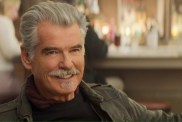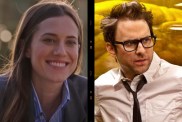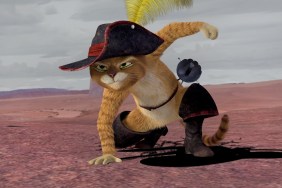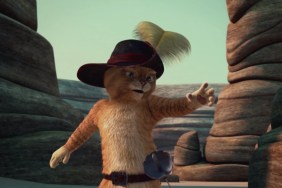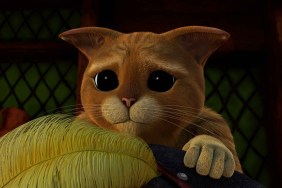This Friday’s release of The Watch marks the second big screen project from director Akiva Schaffer whose 2007 debut, Hot Rod, teamed the “SNL” writer with his Lonely Island compatriots Andy Samberg and Jorma Taccone. This time around, Schaffer is bringing together the comedic team of Ben Stiller, Vince Vaughn, Jonah Hill and — in his first feature film — Richard Ayoade.
Written by Jared Stern, Seth Rogen and Evan Goldberg, The Watch brings an interstellar invasion to suburbia with the only line of defense being four local residents Evan (Stiller), Bob (Vaughn), Franklin (Hill) and Jamarcus (Ayoade) who, though well-intentioned, may prove to be a bigger threat than the invaders.
ComingSoon.net sat down to speak with Schaffer about his sophomore effort, working with a cast of leading comedians, the filmic influences on The Watch and where he sees his career heading in the future.
You can also check out our video interview with the film’s cast by clicking here.
CS: This is a script that existed for some time before you came aboard. How did it come your way?
Akiva Schaffer: Yeah, it was written maybe three years ago now. I probably, before doing all these interviews, should have looked at the date on the first script to have an actual number on that. I’ll say three years. I kind of heard about it in its PG-13 state, but very vaguely. At “SNL,” you’re there every night and just hanging out. You wind up wandering into everybody’s office and you see the pile of scripts. You’re bored and you flip through them. I had seen it a couple of times in different people’s offices. I knew there was a script out there called “Neighborhood Watch,” but that was it. Then, in May of last year, I was doing the Lonely Island “Jack Sparrow” video and it was the last week of the last show of the season and it was the Timberlake/Lady Gaga threeway video. It was Monday and I was just starting to think of it. I realized, “When I’m done with this video, it’ll be the end of my sixth year and that’s probably it for me.” Doing six years sort of felt like the end. I called my agent and said, “I’m thinking about writing a script. Would you just send me anything good that you’ve read recently? Just a good script. I want to read something that you thought was funny just to remind myself what a funny screenplay feels like.” He sent me the script for “Neighborhood Watch” and said, “This just came in. Seth [Rogen] and Evan [Goldberg] just did a big rewrite. It’s now an R-rated version and their kind of comedy.” I thought it was really funny, but there was already someone else directing it, so I was reading just for fun. Maybe two weeks later, it was the beginning of summer and he e-mailed me and said, “Hey, did you ever read that thing I sent you? Because actually there is no director now. If you were interested, you could get your name put on kind of the list and maybe try out for it.” I was like, “Holy s–t! Yes!” I remember seeing “Pineapple Express” and thinking, “Oh, somebody else just made the movie I wish I had made.” This was like getting a second chance at that, reading a script by the same guys and thinking, “I’m going to be jealous of whoever gets to make this” and then going, “Wait, that could be me now?” Ben Stiller was already attached and it was like two weeks of me talking to the studio and talking to the producers, Shawn Levy and Dan Levine. Sometimes talking twice a day just to give them my take on what it would be like. They would say, “That sounds good. Now you should talk to this person.” Ultimately, Stiller was doing Broadway so he was in New York. They sent me over to him and I had a two-hour lunch with him and just kind of pitched him the whole way I saw the movie being done. They had me fly out to L.A. a week later and I have literally not been home since.
CS: It seems like a film where whoever is cast makes a huge impact on the tone the movie takes. How do you go about locking that combination of four different talents?
Schaffer: Ben was already attached, so we knew that one was in place. Then the script was so strong. He signed on because he read that script and I signed on because of that script. Then we were able to go, “Send it over to Vince. He would be awesome.” He read it and knows Ben Stiller. They worked together before. So we had a meeting, me, him and Shawn, where I basically pitched him the same things I had pitched everybody else. “Here’s how I see the movie looking!” He agreed with that and then he kind of pitched back. “Here’s how I would want to tweak the character for me to be able to play it.” All his tweaks sounded good to me so then he came on board. The character of Franklin, even before Seth and Evan, there was a moment after “Night at the Museum 2” where they had so much fun and [Jonah] came and shot with Ben — and this was before Ben was even attached — that Shawn’s wife said, “That Jonah kid should be in your ‘Neighborhood Watch’ movie.” I think that that character had not specifically been written for him, but written hoping that it would be him. I don’t even know if Seth and Evan knew that and just continued it, but the idea was always, “It would be cool if it was that kid.” Then me and Jonah had done a short together at “SNL” called “Andy’s Dad” where Jonah was in love with Andy [Samberg]’s dad. I had known him for a while. We always had this other script called “Adventurer’s Handbook” that we were trying to get going for a while that might come back at some point. So we had always been looking for something to do together, too. When they said, “We were thinking it could be Jonah” I was thinking, “That’s the dream guy for it to be!” Then Jonah, just like me, was like, “Holy s–t! Vince Vaughn and Ben Stiller? If I could tell my 16-year-old self that I’d get to be in a movie with those two guys, he wouldn’t f–ing believe it.” Nothing took convincing, I guess is my point. It was more, “Read the script. You can be in a movie with these two guys.” It’s like, “F–K yeah! I’ll be in that movie!” So we had those three guys, which was the dream cast, and we were debating getting somebody like those three to round it out so that it’s like four. To me, that felt like somehow it would feel like we hadn’t even tried. That we had said, “Who’s the biggest, most famous people? Let’s get them!” I kept saying, “We need to find out McLovin.” That’s what I wanted. Somebody to be our McLovin and be able to surprise you at every turn or whatever. I don’t remember who said Richard Ayoade, but someone said it to me. I didn’t come up with it. I was just like, “Holy s–t! That would be awesome!”

CS: Were you a big “IT Crowd” fan?
Schaffer: I was actually a big Garth Marenghi fan and a big Dean Learner fan. I hadn’t even seen “IT Crowd.” That was on a weekday. On Friday, I went home and realized that “IT Crowd” was on Netflix so I just ran through every single one. Then on Monday I was even more excited because, obviously, he’s hilarious on that show. I got his e-mail and just called him. We had a few friends in common so I was able to make the conversation that way. He had never acted in a movie at all. He had maybe a day part in something. He was just game in a kind of, “Really? Alright! If you say so!” So we had a table read and we flew him out. After the table read, that’s when the studio was like, “Okay! He’s awesome.”
CS: Can you talk a little about the rating and what the switch from PG-13 to R affords you?
Schaffer: It had been PG-13 for a long time and I think that script was also pretty good. It just felt a little tamer, I guess. The R rating is kind of what Seth and Evan do. It’s part of why we all love it. And part of what made the script and the movie special and part of my whole pitch is just this naturalistic feel. It had to feel totally like guys talking how they really talk in the real world. So when aliens come, that’s the crazy thing rather than it all being kind of weird and surreal. Part of that, to me, was that I just love the fact that they then could say, “What the f–k is that?!” rather than “What the heck is that?!” There’s just that extra level of reality to it. I mean, I’d say, “F–k” if I saw an alien. So it was a combination of that and the fact that Seth and Evan had written a draft that was super-funny and a lot of the jokes were dirty because that’s how they write. So it just felt like that’s the movie I wanted to make. It was edgier, too. It just made it all kind of more dangerous and real and cool. There’s a little gore, too. They made it more specific, too, for people who will like this type of movie as opposed to more watered-down and broad.
CS: Sort of to that same point, there’s something refreshing about Costco appearing in the film rather than a fictional equivalent.
Schaffer: Exactly. People who don’t understand how it really works think, “What did Costco pay you?” The truth is that they didn’t pay us. I had to go basically beg them to let us use it. It always throws me off when I’m watching a movie and you can tell it’s supposed to be one thing that’s misspelled like “Cost Club” or “Mega Store” or something terrible like that. That always makes me feel like we’re in an alternate reality. A big point of this movie to me was that it should feel like it’s our reality. That’s it’s any suburb in America that could really exist. That’s not being condescending to the suburbs, either. It’s just real life and how it is and then there’s aliens.
CS: When you’ve got a group of guys like this, it must be a boon in terms of making the set a fun place to be, but is it ever hard to rope everyone in when things need to get serious?
Schaffer: The hardest part of them to rein in is them between takes because they were all so excited to hang out together and to chat. I would cut and it would be like school before the bell rings. Then the teacher has to go, “Alright guys! We’re rolling again! Eyes up front! Eyes up front!” I had to turn me into the schoolmarm and corral them.
CS: On the reverse side of that, how much do you want them to run free during takes?
Schaffer: They’re all filmmakers in their own rights. They know what it’s like in the editing room and what’s useable and what’s not useable. They also know that you don’t really know what’s useable and not useable until you’re in the editing room. We all come from the same school of thought of “get as much as we can now so that I have it later.” But we also all signed on because the script was so good. We’d do three, four, five, six, seven takes or however many it took to have the script good. Then I’d be watching the monitor and go, “Alright. I have the scene as written.” I’d yell out, “Free one!”, which I think is a Vince Vaughn term. Then, I don’t know if they were making it up on the spot or if they were thinking of things while we were doing each take, but then I’d just sit back and watch what they were like when I took the reins off. Those guys are the best in the biz at it and sometimes what came up then would replace the whole scene. Or sometimes elements would. It gave me a ton in editing. It could be as written with little spikes of jokes or new jokes or mostly new jokes with a little bit as written to keep me on story. Some scenes were like 90 percent new stuff.
CS: Are you now thinking that feature films is the future as far as your career goes?
Schaffer: I definitely want to make another one but, if I can get Andy and Jorma [Taccone] free, I’m more excited to make another album right now. We just finished the movie and it’s fun to get to do different stuff. I’m hoping that those guys are free in the next few months and we can go back in the studio. We’ll see.
CS: So what’s a dream project for you?
Schaffer: This kind of was a dream project. I always thought that my second movie would be more in line with a smaller step. Like, my buddies and something kind of low-budget. Some little silly thing. But this was something that was so cool that I don’t think I would have imagined it or I would imagine it down the line a little bit. “One day I’ll get to do the big-budget sci-fi comedy with the coolest movie star comedians out there!” This really was the dream project.
CS: There’s a level of quirkiness to “The Watch” that’s reminiscent of comedies in the ’80s. Was there anything in particular that you tried to sit down and watch to nail the tone?
Schaffer: I watched a bunch of dramatic alien movies like “Alien,” “Aliens,” “Close Encounters” and “E.T.”. Even the new “Star Trek,” because I believe that’s one of the most recent examples of a sci-fi movie that was really good. I watched a bunch of that stuff to remind me of what is in the genre. Where they put the camera that is interesting to signfy alien movies or the kind of lightning they did. I also watched “Ghostbusters” because the dream of this movie is to be like that movie in terms of feeling. There’s nothing specific in this movie to “Ghostbusters,” but just as an overall idea of a bunch of comedians together in a sci-fi comedy, there haven’t been very many of them. That one really pulled it off. I find that “Ghostbusters” and “Alien” actually have a lot in common in that they’re both so naturalistic in the performances. It feels like people you could be hanging out with right now in this room yet they’re on a spaceship or killing ghosts. But the way they talk is never heightened or otherwordly. From both those movies, I tried to take that feeling of supernatural regular guys dealing with crazy stuff.
The Watch hits theaters everywhere this Friday, July 27th.
(Photo Credit: FayesVision / WENN.com)

